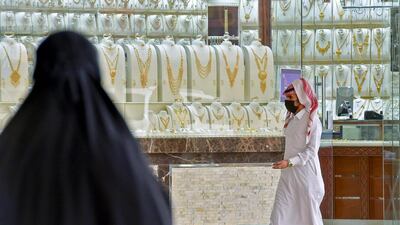Non-oil economic activity in the GCC’s two biggest economies – Saudi Arabia and the UAE – weakened in April, reflecting the global economic slowdown, as nations across the world continue to enforce lockdowns to stem the spread of the pandemic.
The seasonally-adjusted IHS Markit Saudi Arabia Purchasing Managers' Index – a composite gauge designed to give a single-figure snapshot of operating conditions in the non-oil private sector economy – improved slightly to 44.4 in April from 42.4 in March, reflecting a slower reduction in new work and stronger contribution from the suppliers' delivery times. A reading above neutral 50 level indicates economic expansion and below points to a contraction.
April data signalled a survey-record decline in Saudi Arabia’s private sector business activity. Lower business volumes were attributed to business closures on the back of government imposed restrictions on movements and shrinking customer demand. There were pockets of growth in business activity, though, on the back of a rise in healthcare spending.
"The small minority of Saudi Arabian companies reporting business activity growth in April often linked this to higher spending on healthcare products and services,” Tim Moore, economics director at IHS Markit, which compiles the survey, said. “There were also sporadic reports that a successful shift to online operations had helped to limit the overall decline in new work, especially among service providers.”
Survey respondents, however, remained cautious about business prospects for the year ahead, with sentiment lifting fractionally from the record-low seen in March, he noted.
New work in Saudi Arabia also decreased sharply in April, with export sales particularly hard hit by international border closures and lockdown measures abroad. The latest fall in new orders from abroad was the fastest since the survey began in August 2009.
Firms in the UAE were also impacted in April by public health measures taken to curb the spread of the coronavirus. Movement restrictions and company closures led to a record fall in activity, as many companies lowered output and adopted working-from-home policies.
The IHS Markit UAE Purchasing Managers' Index fell to 44.1 in April, down from 45.2 in March. April data also showed that measures to stop the virus's spread led to falls in new business and export sales. Input cost, however, fell last month on lower expenses as employment fell and wages were cut.
On the demand side, firms saw a slowdown in client activity, while shop closures and movement restrictions led to a decline in consumer demand. That said, some businesses noted a rise in online sales. Tourism activity, however, declined sharply again last month, as countries worldwide imposed similar restrictions amid the pandemic.
“Although the Mena PMIs remained firmly in contraction territory in April, the GCC PMIs look remarkably stable at first glance,” Khatija Haque – head of Mena research and Daniel Marc Richards, a Mena economist at Emirates NBD, wrote in a note on Tuesday.
The UAE PMI declined just over 1 point from March, while the Saudi PMI actually rose slightly from March. However, the disruption to global supply chains have resulted in PMI readings around the world being “artificially boosted by lengthening supplier delivery times”, they noted.
Purchasing managers' indexes and production gauges in most developed and emerging economies have dropped in the wake of the pandemic, which has tipped the world into the steepest recession since the 1930s Great Depression. Economies around the world are struggling and job losses are on the rise as business activity slows. The number of people applying for unemployment benefits last week climbed to more than 30 million in the US, the world’s biggest economy, despite the country pouring trillions into its economy to offset the impact of the outbreak.
The pandemic has infected more than 3.5 million people and fatalities have risen to over 250,000, according to the Johns Hopkins University, which is tracking the outbreak. However, economies in Asia, the Middle East, Europe and North America, including some states in the US, are beginning a gradual reopening in a bid to revive business and boost employment.
Saudi Arabia and the UAE have also begun easing restrictions as the kingdom lifted a countrywide curfew and the UAE last week allowed for a controlled opening of malls and other businesses.
The pandemic also affected Egypt's non-oil private sector economy in April, with activity, new business and exports declining at record rates. Output was severely limited, leading firms to cut cost and reduce employment. Egypt’s PMI gauge fell significantly to 29.7 in April from 44.2 in March, the lowest figure recorded since the survey began in April 2011.
"The Egypt PMI sunk to an historic low … as the country faced the first full month of measures restricting activity and movement in the wake of the Covid-19 pandemic. Businesses lucky enough to remain open scaled back activity on a massive scale, as many highlighted sharp falls in domestic sales and foreign demand,” David Owen, an economist at IHS Markit, said.
Business expectations, however, remain strong, improving since March, which may suggest firms will look to retain or re-hire workers once the economy reopens, he noted.


